
Strategize for First Parent Meeting
November 12, 2014
 By Scott Westfall
By Scott Westfall
Coaches often cite parents as one of the most uncontrollable and frustrating aspects of coaching.
Let’s face it, when this relationship goes south, there can be pent-up frustration and hard feelings between the two parties which can result in a negative experience for everyone involved – especially the player who often is caught in the middle.
Establishing positive relationships with parents should happen from the moment you stand in front of them at your annual parent meeting.
Throughout this meeting parents will be asking themselves: “Can I trust this coach with my child?” “Will this coach be fair in his/her decisions?” and “Will this coach always have my child’s best intentions in mind?”
In order to put them at ease, you must do everything possible to establish yourself as a person of integrity who is altruistic and 100 percent trustworthy. Below is a coaching checklist that will help you establish trust and credibility with your team’s parents:
- Transparency – Do things openly and share information as much as possible. If something bad happens on your team, be sure that you do not sweep it under the rug. Be open and consistent with your decisions, and always follow through on what you say you are going to do.
- Demonstrate Respect – Be polite and sincere with parents and let your actions show that you care. Sometimes the little things you do will resonate louder than the big things.
- List Expectations – Have high expectations for the conduct of both the players and parents in your program. List these expectations, distribute them, and then talk about them with the parents. Meanwhile, let them know what they can expect from you in return (proper dress attire, appropriate language, great sportsmanship, impeccable conduct, proper treatment of game officials, etc.).
- Express Loyalty – As often as possible, be sure to praise your players, assistants, and the people associated with your program. Be sure that you never take credit for other people’s work, and remember to use the word “we” as often as possible.
- Be Accountable – This means taking the blame for bad results– even when it wasn’t necessarily your mistake. Admitting when something goes wrong on your watch doesn’t mean that you are a bad coach or you’ve lost control of your program. True leaders are accountable for the mistakes that happen in their programs.
- Deliver Results – This is not necessarily wins and losses. Instead, deliver results on the things that really matter, such as developing a respectable team, coaching players with all passing grades and having players who do not get into trouble or break the law.
No parent meeting would be complete without a healthy dose of paperwork. To make it easier for parents to keep these papers organized, try to color-coordinate the forms and go over them slowly one at a time. Below are the basic documents you should supply at the parent meeting (Note: Try to also have these documents accessible on your team’s website):
- Coaching Philosophy – Drafting a coaching philosophy will allow parents to better understand who you are and the reasons why you coach. In this document, be sure to include your fundamental beliefs along with your personal approach to coaching. (Note: Be honest in this section – Do not advertise yourself as one type of coach, but then act like another.) Include a lot of “I statements” such as, “I coach for the purpose of teaching life lessons,” “I believe that student comes before athlete,” and, “I am demanding but never demeaning.” Developing and drafting a coaching philosophy not only gives parents insight into you and your program, but also gives you an opportunity to reflect upon why you do things the way you do.
- Team Policies – This is perhaps the most important document you will distribute to your team’s parents. It should list all team rules pertaining to player conduct, grades, eligibility, attendance, discipline, communication, and of course playing time! Include statements such as, “Playing time is earned – not given,” “All decisions will be made based on what is best for the team,” and, “If you have a problem, please talk to the coach.” Inform parents that student-athletes will receive equal opportunities but not equal things. These opportunities include instruction, off-season strength and conditioning programs, and support for their classes. How well student-athletes take advantage of these opportunities (attendance, focus, effort, attitude, and self-discipline) often dictates their levels of success. (Note: Before distributing this document, make sure that your school’s administration/athletic director supports your team policies 100 percent).
- Student-Athlete Character Contract – While many schools have had an athletic code of conduct in place for years, teams today are including an additional written set of norms for players to follow. A character contract outlines how players agree to conduct themselves as a person, student, and athlete. If you want to create more buy-in, consider drafting this contract each season with your players!
- Parent Pledge Form – This document establishes the expectations you have for the parents in your program. Be sure that you include expectations for their conduct at games, having a positive disposition around the team, the treatment of players on your team along with the treatment of your opponents, letting the coaches coach, and how to act toward game officials.
- Team Calendar – Be sure to include detailed information on the times and locations of all practices, team events, games, and places that players need to be. If changes are made to the team calendar throughout the course of the season, be sure you inform parents through several forms of communication (a printed note sent home, an announcement on the team website, email list, social media, etc.).
- Athletic Physicals – While most doctors’ offices have a copy of these blank forms on hand, it is convenient for parents to have access to them through your school.
- Athletic Fees (if you are in a “pay for play” district) – Some districts have a mandatory athletic participation fee, while other districts do not. Some districts have a waiver form for students who are on free/reduced lunch. In any of these cases, make sure that you are on top of this information so you can properly inform your team’s parents at the meeting.
- Conflict Resolution – The occasional conflict is almost inevitable while working in an emotionally charged environment such as athletics. However, conflicts can often be avoided or at least more easily resolved through proper forms of communication.
1. Inform parents that you are always willing to listen to their concerns; let them know that you would prefer they address an issue with you, rather than taking their frustrations to the next game and venting to anybody in the bleachers who is willing to listen.
2. In in your team documents consider a statement such as, “The best tool we have in our relationship is an open line of communication. My door is always open, and so is my mind.”
3. Finally, be sure to let them know that if they are upset about something to not send it through email. Email is good for information, but not communication. Try to communicate and resolve conflicts in person as much as possible.
Once you have established trust and credibility with your team’s parents, you can start building the relationship. Caution: Building a relationship with your team’s parents is not developing close friendships with them. Becoming close friends with parents can actually lead to bigger problems as you open yourself to criticism of playing favorites.
Instead, build working relationships, generated through mutual respect and understanding for each other’s position in the quest of helping the young individual become a successful student-athlete. These working relationships help parents understand their optimal level of involvement, such as where and how they can fit into your program. Below are some tips for building working relationships with parents:
- Learn their names and where they work.
- Learn what the family likes to do when they are outside of the school setting.
- Invite them to a team event such as a team picnic, fundraiser, or team trip.
- Ask parents for help with certain jobs. Many parents appreciate being asked to help with team functions as it gives them an opportunity to get to know other parents and makes them feel like they matter.
- Call them at least once per season to say hello, report on their child’s progress, and ask if there is anything you can do to be of assistance.
- Offer additional support for their child. Helping the student-athlete outside of coaching with things such as academics and typical teen issues shows that you care.
- Offer support to the parents as well. If they are struggling to get a message across to their child, oftentimes a coach sending or reinforcing the same message makes all the difference. As a coach you hold a powerful platform with your student-athletes; use it to help with their development and maturity whenever possible.
Establishing yourself as a trustworthy and credible coach is the first step in getting parents to buy into your program. Meanwhile, providing parents with sufficient information will help them feel like you are keeping them informed and want them as a partner in your program.
Creating working relationships with parents takes time, but will be the cornerstone in establishing a positive experience for the years their children are involved with your program. While some parents may have a different background or mindset, listing your expectations will help them better understand your team’s culture and how they can fit in. If done right, these positive working relationships should alleviate much of your coaching frustration and pay tremendous dividends in the future.
Scott Westfall previously spent 10 years as a teacher, coach, and athletic director in Fort Collins, Colo. He currently is working on his Doctorate at Michigan State University, with an emphasis in Sport Psychology and Athletic Administration, and assisting the MHSAA with its student leadership programs. Westfall is a former athlete who participated in football, wrestling, tennis and cross country at the high school level, and rugby at the collegiate level. He can be reached at [email protected].
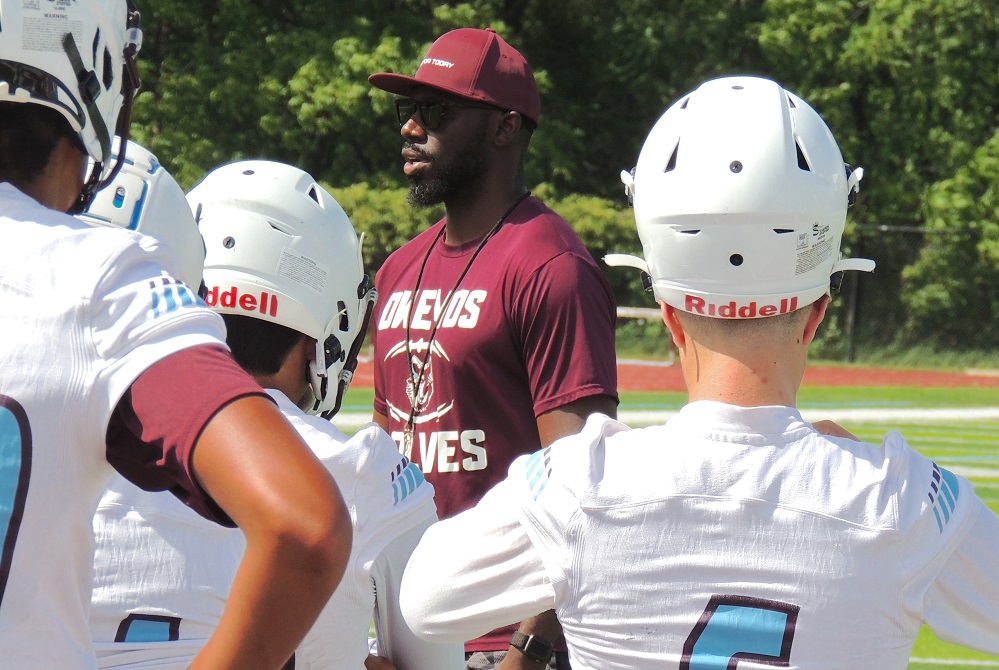
Building Beginning as Okemos Follows 1st-Year Coach Scott-Emuakpor
By
Geoff Kimmerly
MHSAA.com senior editor
August 9, 2022
OKEMOS – The football lay on the turf, landing there before the play had really begun, and the most booming voice from the tallest man on the field yelled a reassuring, “It’s OK. Let’s go,” followed the next play by “Go again,” and then “Figure it out.”
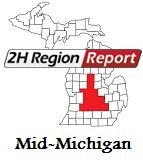 An hour earlier, first-year Okemos varsity football coach Efe Scott-Emuakpor had been on the phone asking a parent to bring the helmet and practice jersey one of his players had left at home. Nearby, another small group also stood helmetless as they hadn’t yet gotten the pre-participation physical required to join their friends on the field.
An hour earlier, first-year Okemos varsity football coach Efe Scott-Emuakpor had been on the phone asking a parent to bring the helmet and practice jersey one of his players had left at home. Nearby, another small group also stood helmetless as they hadn’t yet gotten the pre-participation physical required to join their friends on the field.
Those are typical first-day glitches no matter the school, and fall practices for all sports began Monday at 750 high schools across the state.
But those relatively minor symptoms are what Scott-Emuakpor is focused on treating in the immediate term as he takes on one of the most serious rebuilding efforts in Michigan high school football.
“This is progress,” Scott-Emuakpor said halfway through his team’s first practice, looking out at 39 players on Okemos’ game field – 33 more than showed up for his first offseason workout.
“We’d like to have everything right now. But it’s growing. It’s slowly growing.”
And after Monday, Okemos is one step closer to what would be an incredible turnaround story.
The Wolves have not won since Week 2 of the 2019 season, a stretch of 23 games. After scoring on an 84-yard run during the first quarter of last fall’s opener against Mason, Okemos didn’t score again the rest of the season.
Standing 6-foot-3, and still only a few years from his last college game as a receiver at Ball State University, Scott-Emuakpor looks capable of stepping back into a huddle at a moment’s notice. A little more than a decade ago, in 2011, he was beginning a senior season at East Lansing that would see him cap his varsity career in the MHSAA record book with 134 catches, gaining 1,624 yards, over three seasons. He also was an all-leaguer in basketball and Finals placer in high jump before joining the Cardinals.
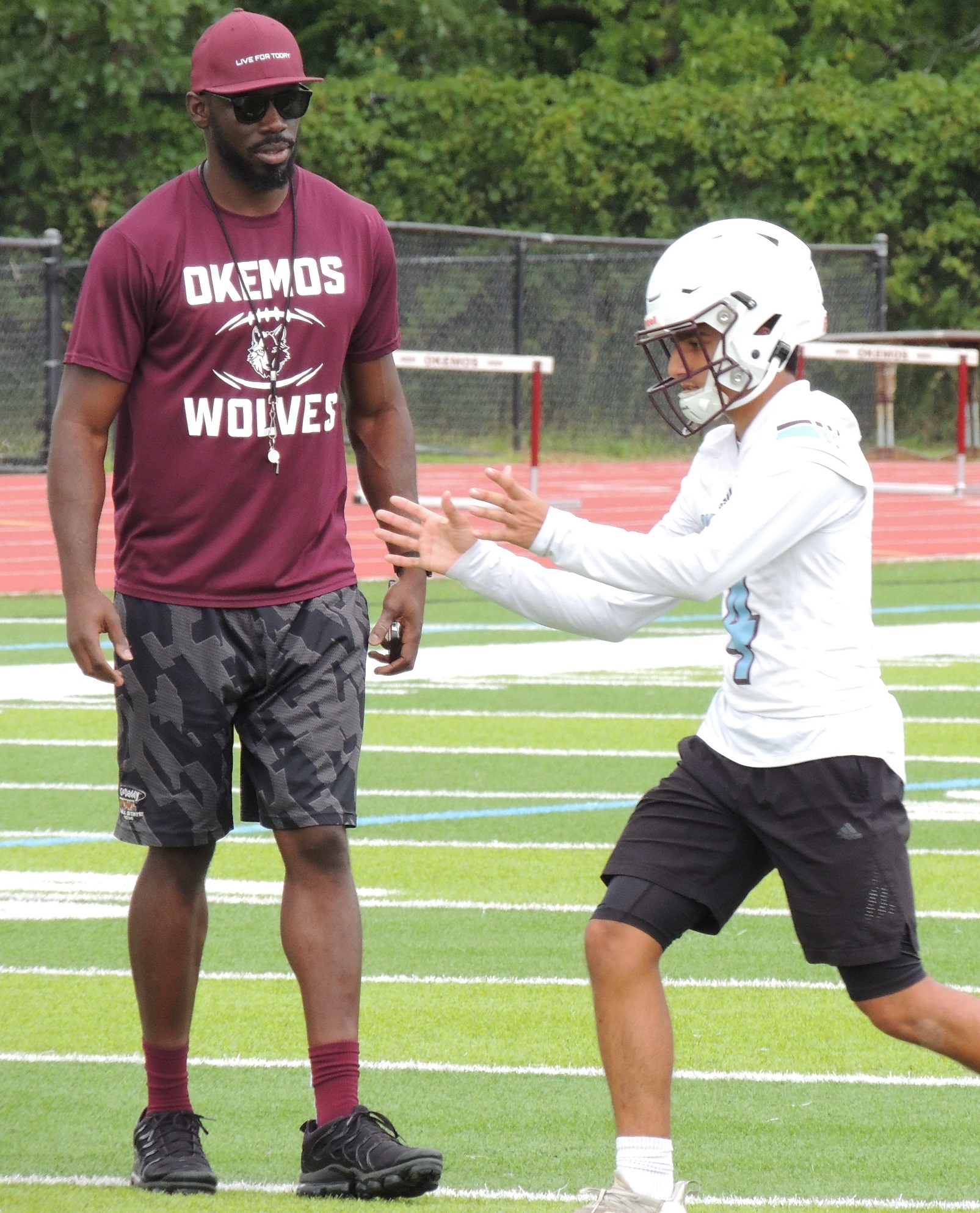 After graduating from Ball State with a computer science bachelor’s degree, and on the way to earning his master’s in business from Saginaw Valley State University, Scott-Emuakpor came home and has worked nearly six years as a business systems analyst with Red Cedar Solutions Group on efforts including the MI School Data website.
After graduating from Ball State with a computer science bachelor’s degree, and on the way to earning his master’s in business from Saginaw Valley State University, Scott-Emuakpor came home and has worked nearly six years as a business systems analyst with Red Cedar Solutions Group on efforts including the MI School Data website.
But that’s just his fulltime job. Scott-Emuakpor also co-founded a clothing line, Live For Today, and over the last five seasons served as a volunteer assistant coach with his hometown Trojans – who have made the MHSAA Playoffs six seasons running.
He'd never applied for a head coaching job. He’d never really considered coaching at that level. In fact, he was pretty happy with how assisting at East Lansing for longtime coach Bill Feraco fit into his schedule and other pursuits.
But Scott-Emuakpor also is a studier. And as a past rival and co-member of the Capital Area Activities Conference Blue, he and East Lansing saw Okemos plenty.
The Wolves had made the playoffs as recently as 2018, and won their first playoff game that season since 2011. Scott-Emuakpor had played against Okemos’ Taylor Moton, now considered one of the NFL’s top offensive tackles. And the school has had loads of success in other sports, annually ranking among the Lansing area’s best in just about all of them and coming off a statewide Division 1 championship in boys soccer from last fall.
“I paid attention to how things have been around here. And I know what they could be capable of,” Scott-Emuakpor said. “This program was once a good program that was very well-respected; I respected them playing against them in high school. They had great athletes. I think my senior year we beat them by one point (20-19 in 2011). So we had good battles.
“I just saw where they’re at. … We have some good kids around here, and I know there’s more in the school not playing. Maybe when they’re sophomores, juniors, they’ll come out. I think I’m capable of getting that interest up, getting them out on the field and just building something.”
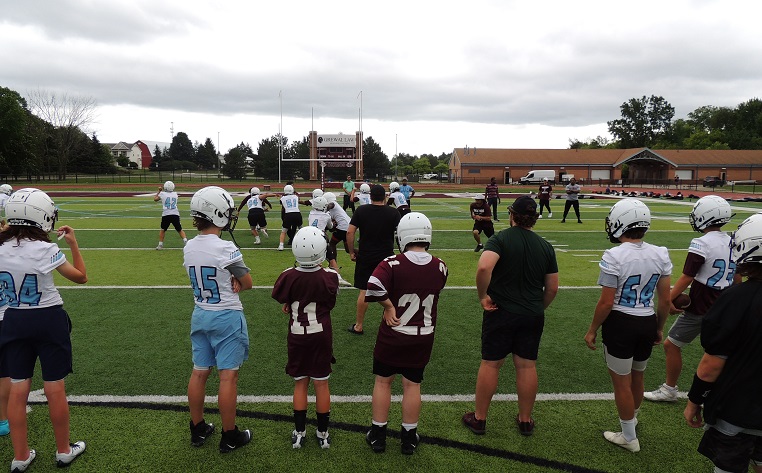 Raj Singh is a senior this fall, one of only five or so Scott-Emuakpor is expecting to come out this week. He’s also a near all-A student, will play some quarterback and safety along with his receiver spot, and was the guy bringing carloads of classmates to workouts over the summer as he joined his coach in recruiting prospective players.
Raj Singh is a senior this fall, one of only five or so Scott-Emuakpor is expecting to come out this week. He’s also a near all-A student, will play some quarterback and safety along with his receiver spot, and was the guy bringing carloads of classmates to workouts over the summer as he joined his coach in recruiting prospective players.
Singh is following his older brother Joe Singh, an admittedly “smaller than everyone” offensive lineman who earned all-league honors as a senior in 2017. When Joe Singh told his younger brother that playing under the lights on a Friday night is a feeling unlike any other, the idea stuck – which is why it made sense when Raj Singh fractured his wrist in Week 2 last season but was back by Week 7 despite a cast covering one hand.
Watching Singh catch passes one-handed last season during East Lansing’s 49-0 win over Okemos stuck with Scott-Emuakpor. Joe Singh had told his little bother that all that matters is having more heart than his opponent and a fighting spirit – in other words, being the type of player Scott-Emuakpor will rely on to get Okemos up and succeeding again.
“I’ve been playing football since I was 6 years old. It’s just been a dream of mine to be at this moment,” Raj Singh said.
“Coach Efe is bringing in a lot of new aspects, and that’s been very helpful to make it different than last year – make us feel a little more at home this year. Compared to last year, he’s brought a lot of structure. We’ve been really coming together as a family … and it just shows Coach Efe wants to build a community around here.”
The process is about more than building stronger, faster bodies and learning football skills and technique. The Wolves aren’t talking a lot about last year, but there’s something there to overcome – and Scott-Emuakpor started working on that soon after he was hired at the end of March.
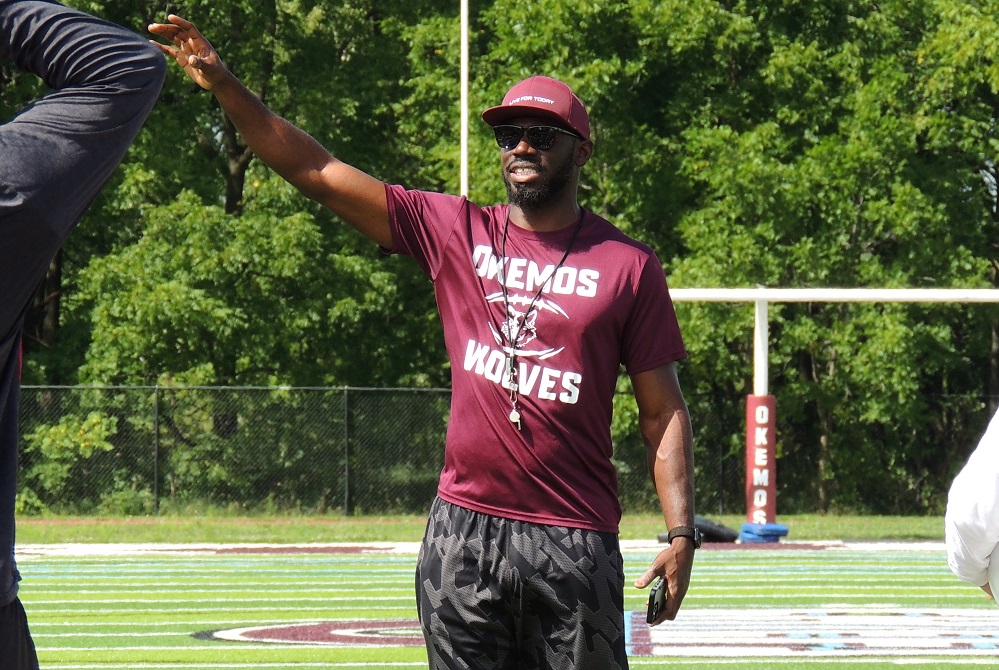 “In the springtime, we were fortunate enough to get in the weight room and I was able to see kids put up good weight and do some things. I’d tell them, ‘You’re actually strong. You’re actually a fast kid,’” Scott-Emuakpor said. “But when you’re not successful for so long, and the way they were losing last year, it was easy for them to not feel confident, not feel they were able to ultimately get the job done. And so I was just there working on minds.”
“In the springtime, we were fortunate enough to get in the weight room and I was able to see kids put up good weight and do some things. I’d tell them, ‘You’re actually strong. You’re actually a fast kid,’” Scott-Emuakpor said. “But when you’re not successful for so long, and the way they were losing last year, it was easy for them to not feel confident, not feel they were able to ultimately get the job done. And so I was just there working on minds.”
Last season was going to be uphill for Okemos no matter what. A mid-summer coaching change brought on by a major fulltime job promotion for the former coach led to an interim staff, players leaving the program, and an applaudable effort to just keep teams on the field.
Scott-Emuakpor has surrounded himself with a staff that includes a pair of his past coaches growing up in East Lansing, past players from when he was coaching there and others with winning experience playing at DeWitt and Williamston.
In addition to what he learned playing and coaching under Feraco, Scott-Emuakpor brings a ton of insight from his experiences at Ball State; he had only one catch during his college career while battling injuries, but he spent that time on the sideline observing his coaches and taking mental notes. Just Sunday, he was pulling from the 2012-13 Ball State football handbook a few details to incorporate into his work in progress with the Wolves.
Okemos will have varsity and freshman teams this fall, and the majority of players at Monday’s combined practice were juniors and sophomores – so recruiting remains ongoing. But Singh said the number of classmates who did come out Monday exceeded his expectations – and that just added to the excitement of starting again.
“If you walk through the school, you’ll see some guys, you’ll (say), ‘OK, what does that guy do?’ You find out he plays (only) lacrosse, or only wrestles, where in other areas, other schools, they might do everything because that’s what they do, what they’ve grown up doing” Scott-Emuakpor said. “I’ve been trying to rebuild that connection, that love for football. A lot of them are very intrigued; I feel like some of them are kinda peeking and saying, ‘What’s going on? This new coach seems to be young and interesting.’ And I’ve just been trying to stay focused on the process and not get too far ahead of myself.”
 Geoff Kimmerly joined the MHSAA as its Media & Content Coordinator in Sept. 2011 after 12 years as Prep Sports Editor of the Lansing State Journal. He has served as Editor of Second Half since its creation in January 2012, and MHSAA Communications Director since January 2021. Contact him at [email protected] with story ideas for the Barry, Eaton, Ingham, Livingston, Ionia, Clinton, Shiawassee, Gratiot, Isabella, Clare and Montcalm counties.
Geoff Kimmerly joined the MHSAA as its Media & Content Coordinator in Sept. 2011 after 12 years as Prep Sports Editor of the Lansing State Journal. He has served as Editor of Second Half since its creation in January 2012, and MHSAA Communications Director since January 2021. Contact him at [email protected] with story ideas for the Barry, Eaton, Ingham, Livingston, Ionia, Clinton, Shiawassee, Gratiot, Isabella, Clare and Montcalm counties.
PHOTOS (Top) First-year Okemos varsity football coach Efe Scott-Emuakpor, middle, huddles up his players during Monday's first day of practice. (2) Scott-Emuakpor confers with senior Raj Singh on blocking from his receiver position. (3) The Wolves work on offense during the first part of their Monday session. (4) Scott-Emuakpor speaks with his team at the start of the workout. (Photos by Geoff Kimmerly.)

